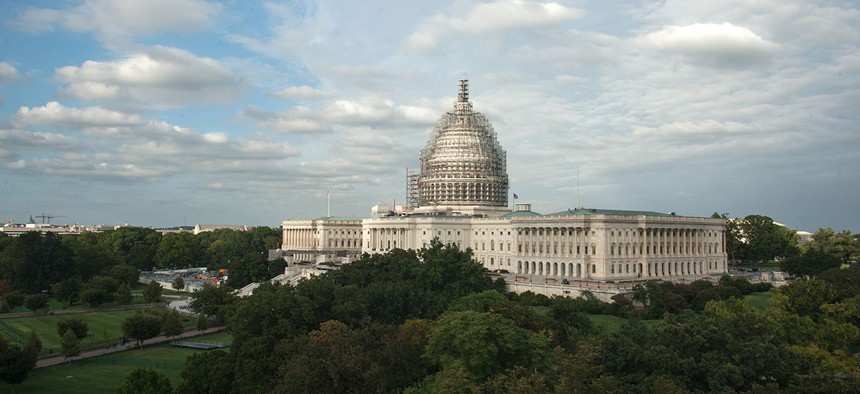
Architect of the Capitol
House Passes Long-Term Transportation Bill
A last-minute amendment offers an influx of cash to the money-needy bill.
In Paul Ryan’s first major act as speaker, the House Thursday passed a six-year, $325 billion transportation bill, setting up a potential respite from years of uncertainty in the transportation sector thanks to short-term patches.
But first, there’s the not-so small matter of a conference with the Senate and the eternal question of funding that has loomed over the transportation debate.
To cover the six years of the bill, members needed to come up with about $16 billion a year to help supplement the dwindling Highway Trust Fund. The House bill, titled the Surface Transportation Reauthorization and Reform Act, came packaged with a patchwork of Senate-passed pay-fors that would only cover about three years of the bill, including sales of oil from the nation’s emergency petroleum reserves.
But offering a lifeline, the House on Thursday passed an amendment from Republican Randy Neugebauer of Texas that could send an extra $40 billion to the Highway Trust Fund by liquidating the Federal Reserve’s capital-surplus account. The amendment—which passed by a 354-to-72 margin—also scrapped some controversial offsets, including cuts to the Fed’s dividend rates and fees on mortgage-backed securities.
That influx of cash could solve Congress’s headache of finding a way to pay for roads while avoiding a tricky debate over raising the 18.4-cent-per-gallon federal gas tax, even if some members were clamoring for the chance to do so on this bill.
In the end, the transportation bill passed in an overwhelming 363-to-64 vote.
“The STRR Act provides strong reforms and policies to help us improve America’s transportation system, and now we can get to work on resolving the differences with the Senate bill and carry a final measure over the goal line,” said Rep. Bill Shuster, chairman of the House Transportation and Infrastructure Committee.
The passage is a victory for Ryan, who becomes the first speaker in a decade to move a long-term transportation bill. It also showcased a relatively smooth display of the “regular order” he promised. Going well into the night on Wednesday, the House debated more than 100 amendments on the bill, and more than 300 in all were introduced.
In a press briefing Thursday, Ryan boasted that more amendments had been debated in the past few days than in the past few months in the House.
The bill also passed despite the inclusion of a reauthorization of the Export-Import Bank, which was included in the Senate-passed bill. Ten amendments related to the Ex-Im Bank didn’t get any traction in the debate and the bill went through, despite some conservative opposition to the revival of the bank, whose charter expired in July.
A separate House bill reauthorizing the bank passed last month, but the Senate is unlikely to take it up, making the transportation bill the most likely vehicle for the bank’s future to be decided.
But it’s not all smooth sailing for the transportation bill. The House bill must still be reconciled with a bill passed by the Senate in July, and members are under some serious time pressure to get it done.
A short-term extension passed last month only keeps the transportation program afloat until November 20. After that point, the Transportation Department has warned that the trust fund will dip below its “prudent cash balance level” of $4 billion, forcing the department to start slowing its reimbursements to states. The fund will recover in December, but would seesaw around that line for months before the fund could go insolvent in the spring.
Members have said that the two bills are not so far apart that a conference will be impossible, but there are still just over two weeks to go. The House is also on recess next week, meaning that members would only be in D.C. for a few days before their self-imposed deadline.
The final passage of a conferenced bill would offer long-term security to the transportation sector for the first time in years. Because of the funding struggle, Congress has not passed a transportation bill longer than two years in that time, which has left states and construction companies gun-shy of investing in large transportation projects.






